Mr. Dodd Takes the Air

Brief Synopsis
Cast & Crew
Alfred E. Green
Kenny Baker
Frank Mchugh
Alice Brady
Gertrude Michael
Jane Wyman
Film Details
Technical Specs

Synopsis
Twenty-three-year-old electrician Claude Dodd of the small town of Pewamo is heard singing by Hiram P. Doremus, president of Morpheus Mattresses, who sponsors a national radio hour at the Metropolitan Broadcasting Company in New York. Doremus brings Claude to New York to appear in his show as "the Master Baritone." When he arrives, however, Claude develops a sore throat and, following an operation, becomes a tenor. Doremus accuses him of falsely selling himself as a baritone and fires him, but the public loves him. MBC secretary, Marjorie Day, helps Claude secure a big contract, and soon his fan club has 217,000 members. Tired of the publicity, Claude spends an evening with Marjorie eating doughnuts and coffee and fixes her radio with an unpatented apparatus he has designed. Marjorie encourages Claude to develop an "artistic temperament" in order to get what he wants, and he becomes an egotist, falling prey to the machinations of blonde golddigger, Jessica Stafford, who hopes to steal his invention through seduction. Jessica introduces Claude to opera prima donna, Mme. Sonya Moro, who takes him under her wing. Meanwhile, Jessica and Jim Lidin scheme to steal Claude's radio gadget, and when Claude finds his house torn apart, Jessica tells him that Marjorie is in league with Lidin. While Mme. Moro finds Claude a penthouse and Jessica spends his money, Marjorie loses her job and Claude plans to marry her. He swears his love and they kiss, but Jessica enters and accuses Marjorie of applying for a patent in her own name. Marjorie tries to convince Claude she filed for the patent to protect him, but he leaves with Jessica. Gossip columns tout the rivalry between Mme. Moro and Jessica for Claude's hand in marriage, but he searches for Marjorie in the rain and lands in the hospital. Another operation changes him back into a baritone. Both Jessica and Mme. Moro visit him as his fiancée, but he tells them he will marry neither of them. When Claude next takes the air, he pretends not to be able to sing in order to get out of his contract and then returns to Pewamo. Meanwhile, his ex-manager, Sniffer Sears, who has won the heart of Mme. Moro, tracks down Marjorie, and she arrives in Pewamo with the patent in Claude's name. Claude tells her he never lost his voice and sings to her after she promises to marry him.

Director
Alfred E. Green
Cast

Kenny Baker
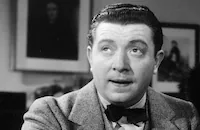
Frank Mchugh

Alice Brady
Gertrude Michael
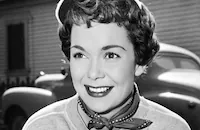
Jane Wyman
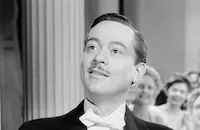
John Eldredge
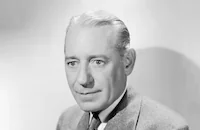
Henry O'neill
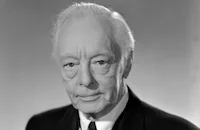
Harry Davenport
Ferris Taylor

Linda Perry
Crew
Milo Anderson
Adolph Deutsch
Al Dubin
Arthur Edeson
Leo F. Forbstein
Charles D. Forrest
Robert Haas
William Wister Haines
Lee Katz
Mervyn Le Roy
Thomas Richards
C. A. Riggs
Elaine Ryan
Harry Warren

Film Details
Technical Specs

Award Nominations
Best Song
Articles
Mr. Dodd Takes the Air
Five years into a film career that began as a chorus girl, Wyman had signed with Warner Bros. a year earlier and was in a slow-but-steady progression from bits to supporting roles, minor leads and, finally, A-List stardom and an Academy Award. During these early days, alternating from brunette to blonde, she specialized in playing tough-talking cuties who fell for the wrong guys, earning the nickname of the "Hey-Hey Girl." At the time of Mr. Dodd Takes the Air, Wyman reflected on her career stating, "I had been through five years of hard times."
But during the same period, answering a studio questionnaire that inquired about her ultimate ambition, Wyman wrote: "To be not just an actress but the actress at the studio." Within 12 years, that seemingly remote goal had been achieved. It was also in 1937 that Wyman met the man who would become her second husband, fellow contract player and future President Ronald Reagan.
Despite Wyman's musical ability, she gets no songs in Mr. Dodd Takes the Air. All the Harry Warren/Al Dubin tunes are performed by Baker, including the Oscar®-nominated "Remember Me." Alice Brady, who would win an Oscar® as Best Supporting Actress for In Old Chicago, also released in 1937, appears in this film as an opera singer.
Producer: Mervyn LeRoy
Director: Alfred E. Green
Screenplay: William Wister Haines, Elaine Ryan, from story The Great Crooner by Clarence Budington Kelland
Cinematography: Arthur Edeson
Art Direction: Robert M. Haas
Original Music: Adolph Deutsch, Harry Warren
Editing: Thomas Richards
Costume Design: Milo Anderson
Principal Cast: Kenny Baker (Claude Dodd), Frank McHugh ("Sniffer" Sears), Alice Brady (Mme. Sonia Moro), Gertrude Michael (Jessica Stafford), Jane Wyman (Marjorie Day), John Eldredge (Jim Lidin).
BW-87m. Closed captioning.
by Roger Fristoe

Mr. Dodd Takes the Air
Quotes
Trivia
Notes
Clarence Budington Kelland's novel was published serially in The Saturday Evening Post (27 August-1 October 1932). Kenny Baker was a popular radio singer, appearing on Jack Benny's program, before making his movie debut in this film.

Miscellaneous Notes
Released in United States 1937
Released in United States 1937














